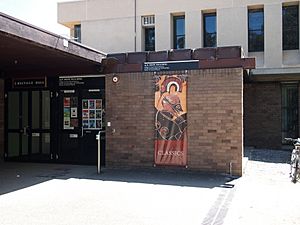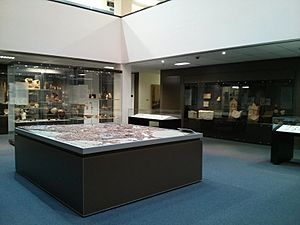Australian National University Classics Museum facts for kids

The entrance to the AD Hope building, which houses the ANU Classics Museum
|
|
| Established | 1962 |
|---|---|
| Location | Canberra, Australia |
| Type | Ancient Greece and Rome |
| Owner | Australian National University |
The Australian National University Classics Museum is a cool little museum located in Canberra, Australia. It started in 1962 at the Australian National University (ANU). Its main purpose was to help students learn all about the amazing ancient Greek and Roman worlds.
Contents
Discovering Ancient Worlds
The ANU Classics Museum was created in 1962 by Dick Johnson. He was a professor at the ANU who taught about ancient cultures. Professor Johnson wanted students in Canberra to see and learn from real objects from ancient Greece and Rome.
Where to Find the Museum
Since the 1970s, the museum has been inside the AD Hope building. This building is on the main campus of the ANU in Acton. It's a special place where history comes alive.
Growing the Collection
By 2004, the museum had about 600 ancient items. Some of these were on loan from private collectors. Others came from government groups. The museum's curator worked hard to care for all these treasures.
A Moment of Missing Items
In December 2004, five items were taken from a display case. The most valuable item was a bronze head. It might have shown Augustus's wife, Livia. At that time, the museum's security was mostly locked cabinets. ANU security guards also checked on the building. All the items had been carefully recorded and photographed.
New Look and Support
In 2010, the museum got a big makeover. It received new display cases and better lighting. There were also new signs to explain the items. The museum officially reopened in August 2010.
A Generous Gift
Later that year, Professor Emerita Beryl Rawson made a very kind donation. She had worked at the ANU for 45 years. Her gift of $400,000 helps the museum. It supports the people who care for the collection. It also helps other activities in the ANU's ancient history program.
Learning and Sharing History
The museum is still a teaching museum today. Students at the ANU can even carefully handle some of the 650 items. This helps them learn in a hands-on way. The museum is also open to the public on weekdays. You can even arrange for a guided tour.
Returning Ancient Treasures
In September 2023, something important happened. The museum found that some items were bought a long time ago. These included an amphora vase, a fish plate, and a Roman marble portrait head. They were bought in good faith, but it turned out they had been dug up without permission. The museum announced that these objects would go back to the Italian government. They will stay in Australia for four more years to be studied. There is a chance this loan could be extended.
See also
 In Spanish: Museo de Clásicos de la Universidad Nacional Australiana para niños
In Spanish: Museo de Clásicos de la Universidad Nacional Australiana para niños


